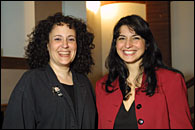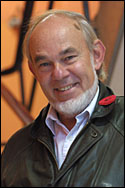Principal's four-star teachers
A statistics class could be a sense-deadening experience. But psychology department faculty lecturer Rhonda Amsel won't let her charges fall asleep, doing whatever it takes to keep those neurons firing.
"There are statistics that are fun," Amsel announces. "Like how long does it take to get an egg out of a refrigerator? You can only wonder why this study was done. It's an interesting eggs-ample." She laughs, "They stay awake." And her students get over any prejudices they might have about the material pretty fast. It's not boring, and they learn.
Amsel is one of four educators at McGill University to be awarded this year's Principal's Prize for Excellence in Teaching, officially presented at the October 31 Founder's Day Convocation.
Two other winners are also from the science faculty: full professor Anthony Williams-Jones, of the Department of Earth and Planetary Sciences; and assistant professor Hanadi Sleiman, of the Department of Chemistry. Associate professor Heather Goad, of the Department of Linguistics, rounds out those honoured.
 Professors Rhonda Amsel and Hanadi Sleiman
Professors Rhonda Amsel and Hanadi SleimanPHOTO: Owen Egan |
|
It's the last time Principal Bernard Shapiro will hand out these awards, as he is leaving McGill. But nothing changed. "It did not occur to me to act differently this time simply because it was the last time in which I would personally be involved. The committee and I proceeded simply in the regular way."
Good teaching is still good teaching.
Principal Shapiro adds, "There are, of course, many professors that I would like to see recognized but who have not yet been so. I assume, however, that in the course of the coming years, they will be."
All four educators honoured this year say that communicating enthusiasm for the material is the key. All four got to that point in very different ways.
Amsel got her master's from McGill in computer science, when the field was nascent. There were no computers around to plug in the programs written as homework - code was corrected by hand.
She arrived in the psychology department some 30 years ago, with a part-time job in statistical programming, where she wrote software for the researchers. She finished up her degree, but stayed in this completely different field.
Her priority is still statistical consulting with professors and graduate students. But the department's (now retired) administrative officer pushed her into teaching, though Amsel is really very shy.
"Why take the risk? It's a personality flaw. I like challenges, I wouldn't have been in math otherwise. I get bored."
She spent five years as associate dean of students. And she's one of 10 winners across the country of the 2002 3M Teaching Fellowships given to individuals who excel in and are dedicated to teaching.
Amsel tailors the material of each class according to her students, spending more time on what they're having trouble with. "There are times I get a little sad, when a student is working very hard and still can't manage to grasp the material. That makes me change the material every year."
Though she has some 500 students a year in her two classes, she gets to know each of them. She loves watching students grow intellectually. "They're going to step beyond you. They could be doing anything in a few years."
The award comes with a bound volume of students' testimonial letters. "It's wonderful. It makes you weep," says Amsel.
* * * *
Assistant professor Hanadi Sleiman, of the Department of Chemistry, loves research, and has just been named a Cottrell Scholar - a fellowship for beginning faculty in sciences. But teaching, she says, keeps her sane.
"If you only did research, you could completely lose perspective. It's a reasonably solitary field... There's no change in people in the immediate."
McGill's award fits right in with her own interests. Most post-secondary institutions are obsessed only with research: "It's such a wonderful thing to have this program. Often universities don't tell you they care about teaching."
Sleiman, a francophone from Lebanon, has always enjoyed teaching. She graduated from Stanford with a PhD, taught at the American University in Beirut, and did postdoctoral work in France with a Nobel Prize winner.
She's been at McGill for four years, appreciating its international reputation as well as Montreal's culture.
Sleiman says she likes to spark enthusiam in her students. "I look forward to it, when we click in class - it's a very immediate satisfaction. When you feel they have developed in that hour, that their minds have advanced in that hour, it's an incredible satisfaction."
She's not quite sure how students could even find the time to nominate her for the principal's teaching award. "We keep them very busy, it's a very tough program. I appreciate them very much."
Sleiman calls herself disorganized and thanks her husband, also a professor in chemistry, for picking up the slack at home (the pair have one child) when she's writing a research grant. She does the same for him, in turn.
The Cottrell gives her about $115,000, which she'll pour back into her research. Her team makes artificial DNA which can used as sensors for genes, helping pick out which genes do what. Another part of the money goes to an outreach program. Her polymer chemistry students will take a "fun" lecture to grade 11 science classes throughout Quebec, hoping to spark an interest in science as a career.
* * * *
Geologist Anthony Williams-Jones prefers to be called Willy.
 Professor Anthony Williams-Jones
Professor Anthony Williams-JonesPHOTO: Owen Egan |
|
A white South African, he fled the country in 1969 after having been fingered as an anti-apartheid activist. He was the president of his student council as the Nationalist federal government was implementing the final few touches in its segregationist policies, banning the few black students there were from universities.
"I was a geologist, yet not allowed to go into any area dominated by black people - that was a lot of the country," says Williams-Jones. He expected to be arrested within the year.
When he was a student, Williams-Jones taught science to nurses in a black night school. They were generally given an inferior education (and inferior credentials). Still, these incredibly motivated students wanted an equal education. It's the experience that propelled him to want to teach.
Instead he ended up as an exploration geologist for the multinational corporation Inco. "I thought it would be good to go out into that environment, then come back with that experience, that it would add to the teaching. But it was kind of risky, there was no guarantee I would get a teaching job after that." He applied to McGill from Brazil and was hired he's been here for 25 years, five as department chair.
His latest research shows that large amounts of metals can be transported in steam - an important discovery connected to volcano eruptions, which are often triggered by water pressure.
Every spring break he takes a group of students to Latin America. "We climb volcanoes, go out to a coral reef. It makes those rocks really come alive for them."
He says sharing in the work and discoveries of graduate students, or "junior colleagues," is exciting.
The downside to his job is giving out marks. "The fun is exciting the students to the subject. This business of having to assign grades to students is distracting."
* * * *
Linguistics associate professor Heather Goad assumed the note in her mailbox from the principal's office was about her impending maternity leave. "I opened it and my jaw hit the floor."
She, too, always wanted to teach. But what to teach was another matter. "My strengths were language and math - I thought I must be really odd, with an arts side and a science side."
She picked a linguistics class while thumbing through a course calendar. "On the first day I was hooked. Here is the link! It's the structure of language, the math of language."
She did her PhD at the University of Southern California, and was hired at McGill in 1992.
No one particular person influenced her desire to get up in front of classrooms of students. "It was more the learning environment that had an impact."
About half the students in an introductory class are there because it's an elective that fits conveniently into a schedule, or it might complement their main interest. Her high energy level brings those students into the material. "A feedback loop feeds me.
"I am very shy, I'm not an exhibitionist at all. I'm not an entertainer. I'm teaching rigorous material."
Goad also won the Faculty of Arts' H. Noel Fieldhouse Award for Distinguished Teaching (see page 7). "I was not as surprised," she says. "But with the principal's, you don't hear anything. Once it moves outside the faculty level, there's much less understanding of how things work. It's a completely unknown entity."
The award also comes with a $5,000 cheque. "That was a wonderful surprise. I'm not sure what I'll spend it on."
Goad says there is a connection between research and teaching. "There's a lot of new content that gets put into introductory-level courses. Current research and thinking ends up in the classroom. There's an important link."

